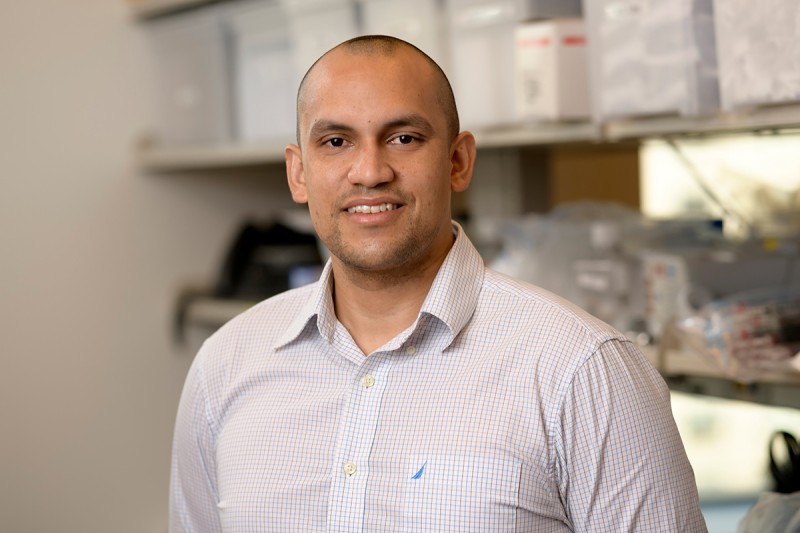
Luis Felipe Somarribas Patterson, a postdoc in the Santosha Vardhana Lab
Luis Felipe Somarribas Patterson joined the Santosha Vardhana Lab in Memorial Sloan Kettering Cancer Center’s Human Oncology & Pathogenesis Program as a postdoc in 2021.
He investigates how metabolism influences different cell types, including immune cells, and conducts research into “exhausted T cells,” a state of T cell dysfunction that arises during chronic infections and cancer.
“I am exploring the metabolic features of these T cells in the hope of improving cancer treatment, especially in combination with immunotherapies,” Luis says. “In the Vardhana Lab, we are currently focused on melanoma and pancreatic and breast cancer, but I hope my work will also apply to other types of cancer.”
Growing Up in Paradise
Luis was born and raised in Costa Rica, arguably one of the most beautiful places on the planet. A small country in Central America, Costa Rica is known for its beaches, volcanoes, and biodiversity. Approximately one-quarter of its area is made up of protected jungle abundant with wildlife, including spider monkeys and quetzal birds.
Luis’ parents separated when he was very young, and Luis and his brother, Wendell, were raised by their mother, grandmother, and aunt. Their mother ensured they grew up with an appreciation for the rich culture of her native Nicaragua. She also raised her sons to be persevering and resilient, with a deep, abiding love for nature and animals — qualities Luis later came to recognize as the foundation of his life as a scientist.

Luis and his brother, Wendell (right), playing in the family garden
Although he grew up in a city, Heredia, Luis had ample opportunity to explore the countryside. He and his father continued to be close, and Luis and Wendell often spent holidays with members of their father’s family who lived along the Pacific coast of Costa Rica. There, they enjoyed playing at the beach, visiting a small farm owned by the family, and reveling in the natural world all around them. But soon, Luis’ simple appreciation of nature became complicated by questions he found himself asking and scientific advances he learned about. He remembers as a teenager being fascinated by the concept of gene manipulation and the ability of scientists to create new and improved versions of organisms, like transgenic plants that can withstand climate change. Driven by curiosity about the world around him, Luis decided to study biology in college.
But it was his brother’s tragic death from cancer, when Luis was 20 years old, that set him firmly on his path, and made the pursuit of cancer science his singular ambition.
“Losing my brother was the most difficult situation I have ever experienced,” Luis remembers. “I am passionate about cancer research because I intrinsically like it, but also because I want to help improve the survival and quality of life of people with cancer.”
Luis attended National University in Costa Rica, where he majored in biology as planned. He then earned a master’s degree in biomedical sciences, with an emphasis on biochemistry, at the University of Costa Rica.
Once he earned his master’s, Luis decided it was time to look beyond Costa Rica. He was accepted into an internship program in Germany and spent five months working in labs there before deciding to pursue his PhD in biosciences at the German Cancer Research Center and Heidelberg University.
Becoming a Scientist

Physician-scientist Santosha Vardhana
“I had long been interested in cancer metabolism, immuno-oncology, and brain cancer,” he says. “Once I earned my PhD, I decided that I wanted to launch my academic career in the United States. The U.S. is one of the leading countries in the world for cancer research — doing my postdoc here seemed like a natural next step.”
Given his focus on cancer metabolism, Luis was very familiar with the work of Craig B. Thompson who, at the time, was MSK’s President and CEO. He emailed Dr. Thompson directly to inquire about postdoc opportunities in his lab.
“He offered me an interview,” says Luis. “He was the first person at MSK that I talked with.”
In 2020, with the pandemic underway, Luis had a Zoom interview with Dr. Thompson and Dr. Vardhana, who had recently opened his lab.
“We had a great conversation, and I was offered a spot in Santosha’s lab,” Luis says.
2020 was a year of milestones for Luis. In addition to entering a new phase in his scientific life, Luis became a father. He and his wife, Karol, who also earned her PhD in Germany and is now a research associate and lab manager at New York University, welcomed their daughter, Naomi, a few months before making the move to New York.
The Passionate Pursuit of Cancer Science
“One of my favorite things about being a postdoc at the Sloan Kettering Institute is that I get to continue learning about science, discovering what is happening in different cell types, and trying to understand how our research can help patients in the future,” Luis says.
He is mentored by both his lab head, Dr. Vardhana, and his first interviewer — Dr. Thompson.
“I go to Craig’s lab team meetings, and I listen,” says Luis. “But I also get to present my own research and get feedback from Craig and the postdocs in his lab, as well as input from Santosha and my labmates. There are countless opportunities to learn from others and hear their perspectives.”
Luis also enjoys the culture at SKI, which he says is extremely supportive and collegial.
“Everything at SKI is geared toward helping you realize your goals, whatever they may be,” he says. Luis’ goal is to conduct cancer research in his own lab.
But — for now — he is content to explore New York City with his wife and young daughter. Even here, he manages to share his love of nature with 2-year-old Naomi.
“I take Naomi to Central Park a lot,” he says. “It’s one of our favorite places.”

